Post-Diploma Training in Cardiology Details are mentioned below:
Post-Diploma Training in Cardiology. Mobile No. 01987-073965, 01797-522136. These Courses are 6 Months PDT-Cardiology, 1-Year PDT-Cardiology, and 2-Year PDT-Cardiology. 6 Month PDT Cardiology course Fee is Tk 35000/-, 1 Year PDT Cardiology Course Fee is Tk 65000/-, and 2 Years PDT Cardiology Course Fee Tk 125000/-. Each Semester of 6 Months contains 4 subjects and an exam mark of 400.
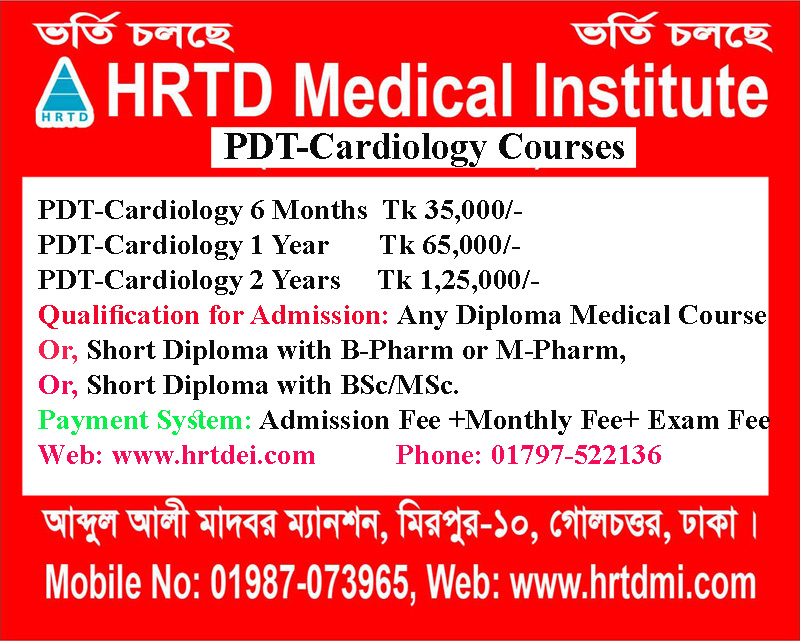
6 Months Post-Diploma Training in Cardiology (PDT-Cardiology 6 Months) Details:
6 Months Post-Diploma Training in Cardiology that is PDT-Cardiology 6 Months Course Fee 35000/-. The payment system is an Admission Fee of Tk 10000/-, Monthly Fee of Tk 4000/- and Exam Fee of Tk 1000. 6 Months PDT-Cardiology Course contains 4 subjects. You can choose any 4 of these subjects Cardiovascular Anatomy & Physiology, Cardiovascular Drugs, Common Cardiovascular Disease, Ischemic Heart Disease, Cardioconductive System, and Heart Block.
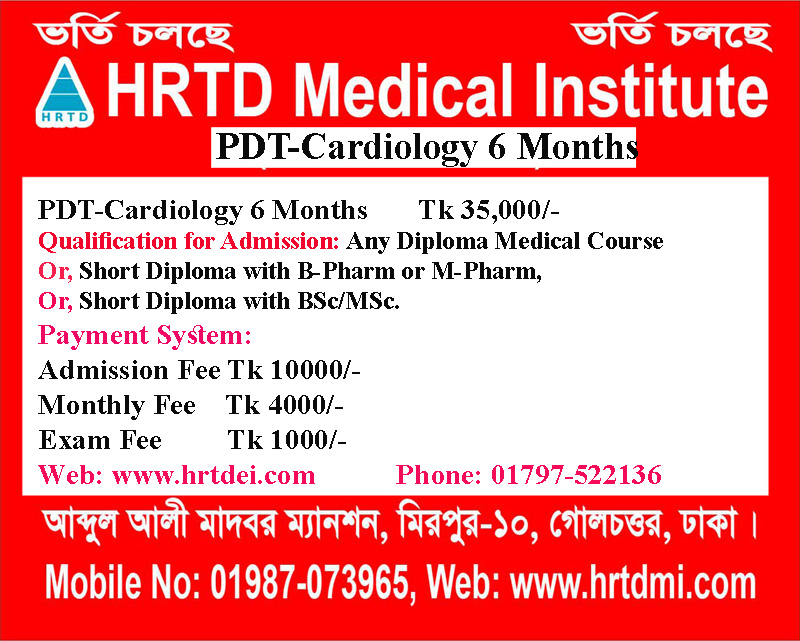
1 Year Post-Diploma Training in Cardiology (PDT-Cardiology 1 Year) Details:
1 Year Post-Diploma Training in Cardiology that is PDT-Cardiology 1 Year Course Fee Tk 65000/-. The payment system is an Admission Fee of Tk 15000/-, Monthly Fee of Tk 4000/- and Exam Fee of Tk 2000. 1 Year PDT-Cardiology Course contains 8 subjects. You can choose any 8 of these subjects Cardiovascular Anatomy & Physiology, Cardiovascular Drugs-1, Cardiovascular Drugs-2, Common Cardiovascular Disease, Ischemic Heart Disease, Cardioconductive System & Heart Block. Coronary Blood Circulation, Coronary Heart Diseases, ECG, Echo & ETT, Cardiovascular Surgery.
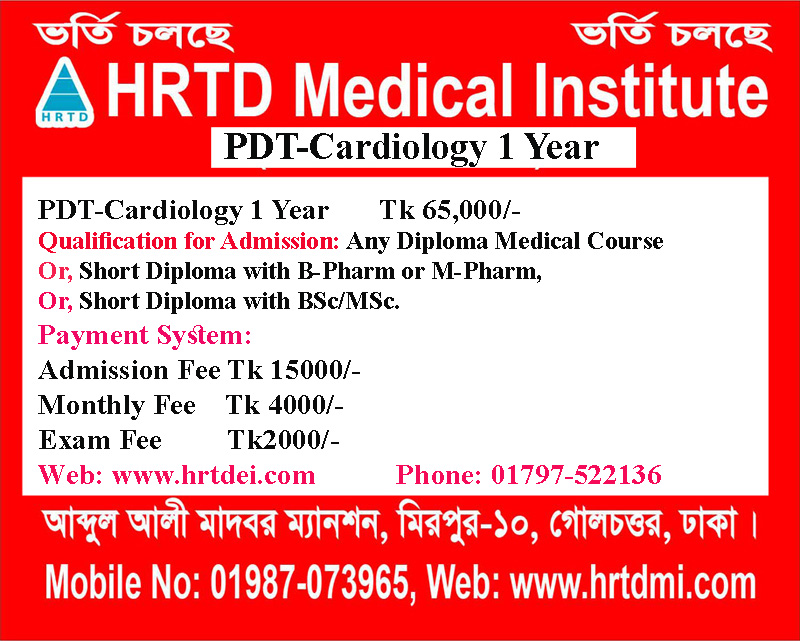
2 Years Post-Diploma Training in Cardiology (PDT-Cardiology 2 Years):
2 Years Post-Diploma Training in Cardiology that is PDT-Cardiology 2 Years Course Fee Tk 125000/-. The payment system is an Admission Fee of Tk 25000/-, a Monthly Fee of Tk 4000/-, and an Exam Fee of Tk 1000/- per Semester. 2 Years PDT-Cardiology Course contains 16 Subjects. Some subjects of PDT-Cardiology are Cardiovascular Anatomy & Physiology, Cardiovascular Drugs, Cardioconductive System & Heart Block, Coronary Blood Circulation, Coronary Heart Diseases, ECG for Medical Practice, Echo & ETT for Medical Practice, and Cardiovascular Surgery. the practice of Cardiovascular Drugs, Prevention of Cardiovascular Disease, Cardiovascular Neurology, Cardiovascular Biochemistry, Cardiovascular Endocrinology, and Cardiovascular embryology.
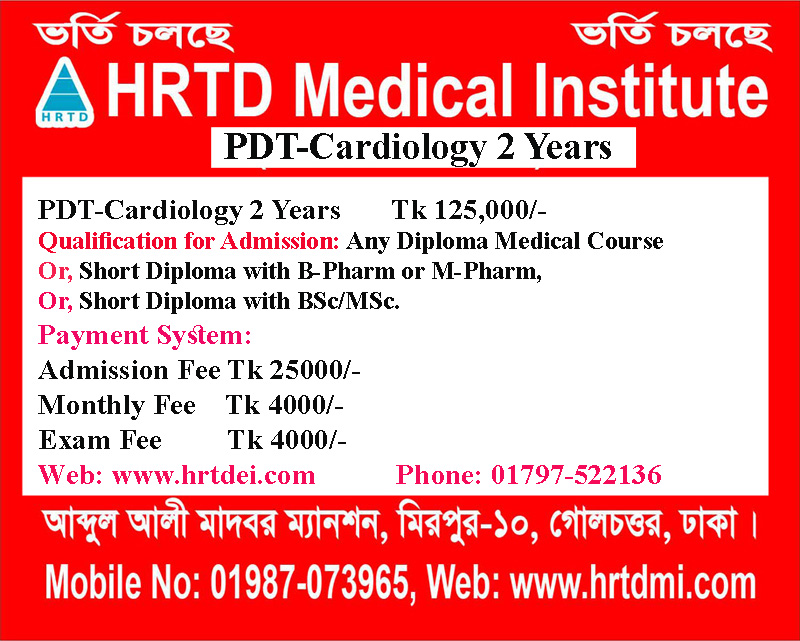
What are the Parts of the Cardiovascular System?
Parts of the Cardiovascular System are The Heart, Blood Vessels, and Blood. Blood Vessels are of 3 Types. They are Arteries, Veins, and Capillaries.
Arteries are the Blood Vessels through which Bood is supplied from The Heart to All the tissues of the body.
Veins are the Blood Vessels through which Blood is drainage from all the tissues to the Heart.
Capillaries are the filtering Blood Vessels that are connected with arterioles and venules. All exchanges between blood and tissues are performed through the capillaries.
What are the common Cardiovascular Diseases?
Common Cardiovascular Diseases Are Hypertension, Hypotension, Tachycardia, Bradycardia, Heart Failure, Angina Pactoris, Myocardial Infarction, Heart Blockage, Heart Block, SA Block, and AV Block.
What are the common ways (Mechanisms) of reducing blood pressure?
There are three common ways ( Mechanisms) of reducing blood pressure:
- Reducing Heart Rate ( It is only applicable when Heart Rate is High)
- Dilating Blood Vessels
- Reducing Blood Volume ( This mechanism is applied in case of Hypertension Emergencies. But there is a risk of Hypotension. So the patient should be taken under monitoring blood pressure always)
What are the common Cardiovascular Drugs Classes?
Common Cardiovascular Drug Classes are Antihypertensive Drugs, Anti Angina Drugs & Anti Ischemic Drugs, Antiarrhythmic drugs, Peripheral & Cerebral Vasodilator drugs, Anti Platelet Drugs, Fibrinolytic Drugs, Antifibrinolytic & Haemostatic Drugs, Lipid-lowering drugs, Anticoagulants & Protamine, Sympathomimetics, Positive Inotropic drugs (Cardiac glycosides), and Local Sclerosants.
What are the common Antihypertensive Drug Classes?
Common Antihypertensive Drug Classes are summarized by ABCD.
- ACE Inhibitor Drugs
- Beta Blocker Drugs
- Calcium Channel Blocker Drugs
- Diuretic Drugs
 HRTD Medical Institute
HRTD Medical Institute



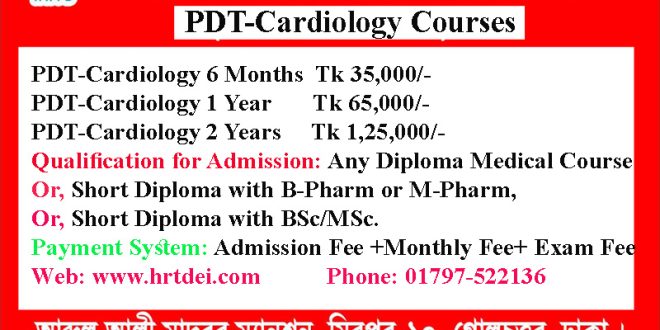


One comment
Pingback: Post Diploma Training in Gynecology (PDT-Gynecology) 6 Months, 1, 2 years